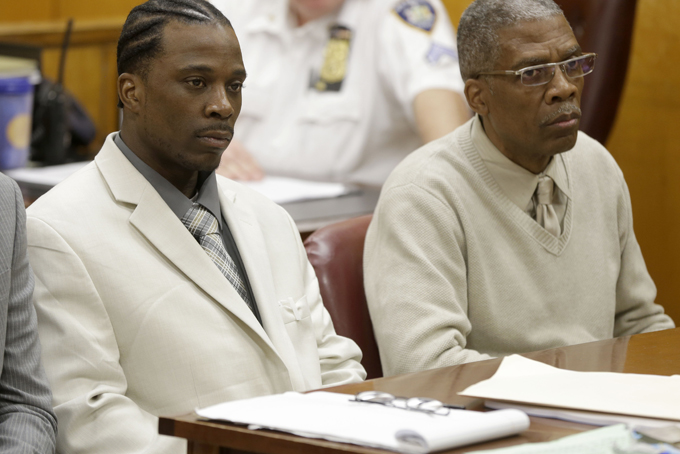
Vincent George Sr., right, and Vincent George Jr. listen to closing arguments in a courtroom in New York, June 6, 2013. (AP Photo/Seth Wenig)
by Colleen Long
Associated Press Writer
NEW YORK (AP) — The evidence of sex trafficking was tattooed on the bodies of the prostitutes: Their pimps’ names branded onto skin, scrolled across chests and inked onto pelvises, prosecutors said.
They were women so traumatized by their horrible circumstances that they lied on the witness stand to protect their abusers in a criminal trial in Manhattan, prosecutors said during closing arguments Thursday in the case. Three women testified that they begged the father and son team for the tattoos, eager to show their love for the men.
They said they were one big happy family, living a suburban life as “wife-in-laws” in Allentown, Pa., commuting by night about 100 miles to work the Manhattan streets.
According to assistant district attorney John Temple, the testimony was given “to minimize the horrors of their lives and to put a flippant and disgusting spin on the tragic wrong.”
“Attempts have been made to portray the lives of these women as somehow glamorous,” he said. “But your honor, this is not the movie ‘Pretty Woman’ and the women in this case are not Julia Roberts.”
The judge said she will render her verdict June 19 in the bench trial of Vincent George Sr. and Vincent George Jr. The men, who have admitted promoting prostitution, pleaded not guilty to sex trafficking, money laundering and other charges.
“What I don’t understand is why people refuse to understand that some women want to be in this lifestyle. This is what they always wanted to do and they willingly entered that lifestyle,” defense attorney Howard Greenberg said in court Thursday, describing one of the women as a “happy hooker.”
During the trial, the women told the packed courtroom about big houses, nice cars, vacations in Florida and lavish physical attention from their men.
“The whole point to our family was just to become better,” said a 31-year-old woman who said she met Vincent George Jr. when she was 17. “This wasn’t our lifestyle. This wasn’t something where we said, ‘Hey, I’m going to do this until I’m gray.'”
The men used a music recording company and a livery car service to launder millions of dollars for the prostitution business, prosecutors said.
Prosecutors say the women made as much as $500,000 a year for the Georges but got only a few dollars a night themselves. They had no bank accounts, no property. They were threatened with beatings when they didn’t bring in as much money as expected or were late to check in, according to wiretap conversations played at trial.
“Bring me my (expletive) money right now and get your ass back to work,” George Jr. said to one woman.
The Associated Press is not naming the women because they are alleged victims of sex crimes.
Legal experts say the notion of prostituted women standing by their pimps is common, but that defending them before a judge is not. While most sex-trafficking cases hinge upon the cooperation of the women involved, prosecutors relied upon wiretaps and follow-the-money techniques that are typically used to prosecute white-collar crime.
Greenberg denied allegations the women were living in fear.
“None of them were forced to enter the life,” he said. “None of them were forced to stay in the life. They were all in the life before they met any pimp named George.”
Wearing a striped dress that revealed her pregnant belly, a 26-year-old woman had a tattoo on her neck that said “King Kobe,” a nickname for George Jr., whom she met when she was 19 and working as a prostitute in upstate New York.
“I would say that I make my own choices,” she said. “I am not a dumb person. I know what I’m doing.”
The women have been sexually exploited and stripped of their self-worth, said Norma Ramos, executive director of the Coalition Against Trafficking in Women. Ramos said tattoos are commonly seen among sex trafficking victims.
“They’re branding their women. They’re branding their victims,” Ramos said. “They’re treating them like cattle.”
Two of the women used the word “daddy” when describing their relationship with George Jr. in court.
“I’m not a victim towards anything, and I think the best way to show and prove that is for me to be here,” said a 24-year-old woman who began working as a stripper and streetwalker at age 13, according to prosecutors.
One photograph presented by the prosecution shows the woman with a visible black eye in 2007. At the time, she told former prosecutor David Novick that George Jr. caused the injury.
“She said she deserved it, and it wasn’t a big deal,” Novick told the court during his testimony.
The women were far from free, Temple said. In another recorded conversation, one of the women is telling George Sr. that she needs rest. “I feel tired,” she says.
“You’re a damn liar, you’re a liar,” he replies.
“But I’m not calling you stupid,” she says meekly and begins to cry.